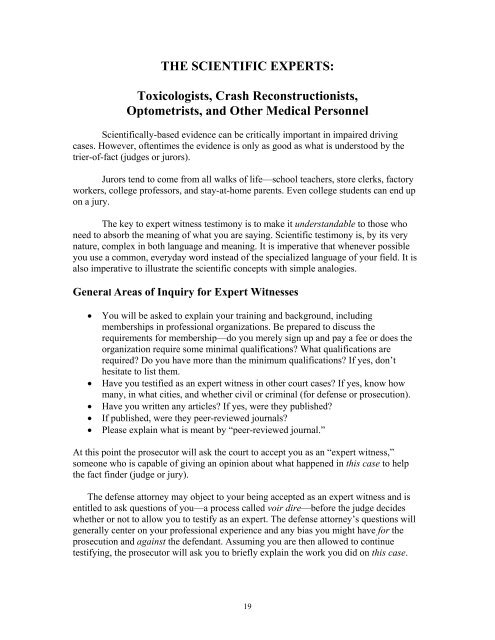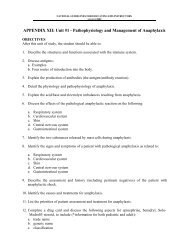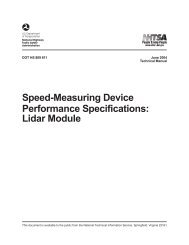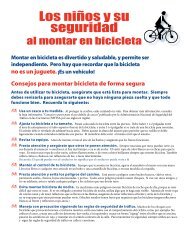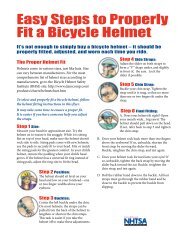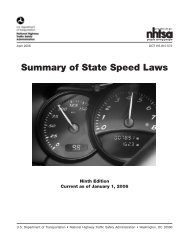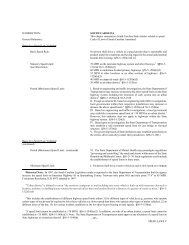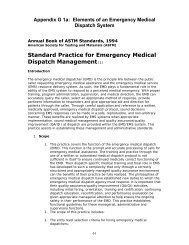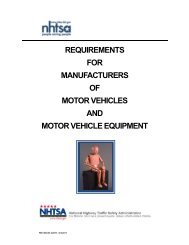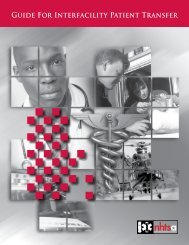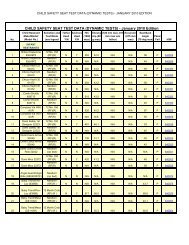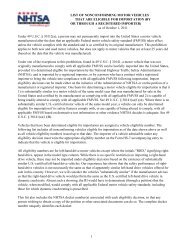The Criminal Justice System: A Guide for Law Enforcement ... - NHTSA
The Criminal Justice System: A Guide for Law Enforcement ... - NHTSA
The Criminal Justice System: A Guide for Law Enforcement ... - NHTSA
Create successful ePaper yourself
Turn your PDF publications into a flip-book with our unique Google optimized e-Paper software.
THE SCIENTIFIC EXPERTS:<br />
Toxicologists, Crash Reconstructionists,<br />
Optometrists, and Other Medical Personnel<br />
Scientifically-based evidence can be critically important in impaired driving<br />
cases. However, oftentimes the evidence is only as good as what is understood by the<br />
trier-of-fact (judges or jurors).<br />
Jurors tend to come from all walks of life—school teachers, store clerks, factory<br />
workers, college professors, and stay-at-home parents. Even college students can end up<br />
on a jury.<br />
<strong>The</strong> key to expert witness testimony is to make it understandable to those who<br />
need to absorb the meaning of what you are saying. Scientific testimony is, by its very<br />
nature, complex in both language and meaning. It is imperative that whenever possible<br />
you use a common, everyday word instead of the specialized language of your field. It is<br />
also imperative to illustrate the scientific concepts with simple analogies.<br />
General Areas of Inquiry <strong>for</strong> Expert Witnesses<br />
• You will be asked to explain your training and background, including<br />
memberships in professional organizations. Be prepared to discuss the<br />
requirements <strong>for</strong> membership—do you merely sign up and pay a fee or does the<br />
organization require some minimal qualifications? What qualifications are<br />
required? Do you have more than the minimum qualifications? If yes, don’t<br />
hesitate to list them.<br />
• Have you testified as an expert witness in other court cases? If yes, know how<br />
many, in what cities, and whether civil or criminal (<strong>for</strong> defense or prosecution).<br />
• Have you written any articles? If yes, were they published?<br />
• If published, were they peer-reviewed journals?<br />
• Please explain what is meant by “peer-reviewed journal.”<br />
At this point the prosecutor will ask the court to accept you as an “expert witness,”<br />
someone who is capable of giving an opinion about what happened in this case to help<br />
the fact finder (judge or jury).<br />
<strong>The</strong> defense attorney may object to your being accepted as an expert witness and is<br />
entitled to ask questions of you—a process called voir dire—be<strong>for</strong>e the judge decides<br />
whether or not to allow you to testify as an expert. <strong>The</strong> defense attorney’s questions will<br />
generally center on your professional experience and any bias you might have <strong>for</strong> the<br />
prosecution and against the defendant. Assuming you are then allowed to continue<br />
testifying, the prosecutor will ask you to briefly explain the work you did on this case.<br />
19


